

INFP Connection. . . Library.thinkquest.org/C004361/infp.html. As of July 1, 2013 ThinkQuest has been discontinued.
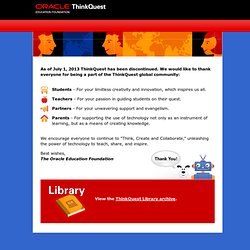
We would like to thank everyone for being a part of the ThinkQuest global community: Students - For your limitless creativity and innovation, which inspires us all. Teachers - For your passion in guiding students on their quest. Partners - For your unwavering support and evangelism. Parents - For supporting the use of technology not only as an instrument of learning, but as a means of creating knowledge. [INFP] 30+ INFPs: Your Advice to Younger INFPs? INFP - The Dreamer. INFP - The Dreamer Profile by Sandra Krebs Hirsch and Jean Kummerow INFPs focus deeply on their values, and they devote their lives to pursuing the ideal.
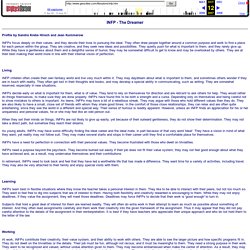
They often draw people together around a common purpose and work to find a place for each person within the group. INFP Characteristics. The INFP has two contrary characteristics, curiosity and shyness.
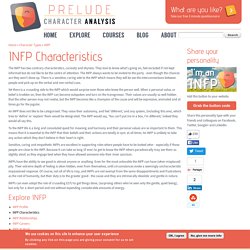
They love to know what's going on, feel excluded if not kept informed but do not like to be the centre of attention. The INFP always wants to be invited to the party - even though the chances are they won't show up. There is a sensitive, caring side to the INFP which means they will be see the interconnections between people and pick up on the verbal and non-verbal cues. Yet there is a crusading side to the INFP which would surprise even those who knew the person well. When a personal value, or belief is trodden on, then the INFP can become outspoken and turn on the transgressor. INFP Personality Type. Enneagram... Exploring Your True Self. Nine Ways to be an Introvert by E Wagele I saw something today on my web site’s INFP page that sent a chill up my spine: “The inferior functionIntroverted feelers’ least developed and most unconscious function is extraverted thinking, which may be triggered by being criticized or self-criticism.
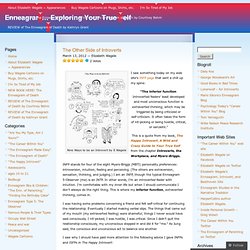
INFP Profile. Introverted iNtuitive Feeling Perceiving by Joe Butt Profile: INFP Revision: 3.0 Date of Revision: 26 Feb 2005 "I remember the first albatross I ever saw. ...
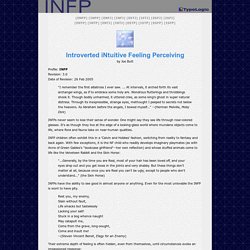
At intervals, it arched forth its vast archangel wings, as if to embrace some holy ark. Wondrous flutterings and throbbings shook it. Though bodily unharmed, it uttered cries, as some king's ghost in super natural distress. INFPs never seem to lose their sense of wonder. Infp Companion. This is a mind map made during and after one of my own flips.
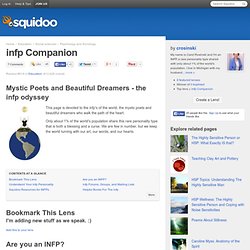
My very judgmental and demanding thoughts are on the right side of the map, and to the left are my thoughts as I come back into myself. A few of you wanted to know a more about this map, so here are more of my thoughts about it. This map shows my flip or shadow experience as I experienced it. I'm sure your experiences are different, and that's okay because INFPs are beautifully original in all they do. I'm not an expert on flips, but I think that word describes the feeling of slipping into one very well.
Portrait of an INFP. As an INFP, your primary mode of living is focused internally, where you deal with things according to how you feel about them, or how they fit into your personal value system.
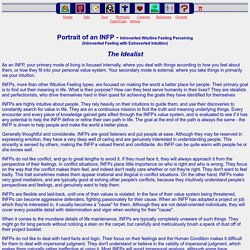
Your secondary mode is external, where you take things in primarily via your intuition. INFPs, more than other iNtuitive Feeling types, are focused on making the world a better place for people. Their primary goal is to find out their meaning in life. What is their purpose? How can they best serve humanity in their lives?
INFPs are highly intuitive about people. INFP Personality Types - overview. Each letter in the personality type code - I, N, F, and P - describes a preference for a way of thinking or behaving.
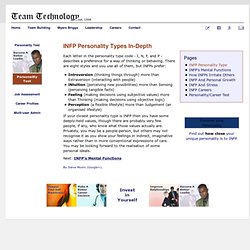
There are eight styles and you use all of them, but INFPs prefer: Introversion (thinking things through) more than Extraversion (interacting with people)iNtuition (perceiving new possibilities) more than Sensing (perceiving tangible facts)Feeling (making decisions using subjective values) more than Thinking (making decisions using objective logic)Perception (a flexible lifestyle) more than Judgement (an organised lifestyle) The INFP in Life, Work, and Love - A Personality Type Profile. Recognizing an INFP INFPs may initially seem cool, as they reserve their most authentic thoughts and feelings for people they know well.
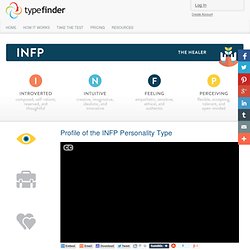
They are reflective and often spiritual, and often interested in having meaningful conversations about values, ethics, people, and personal growth. Typically curious and open-minded, the Healer continually seeks a deeper understanding of themselves and of the people around them. They are passionate about their ideals, but private as well; few people understand the depth of the INFP’s commitment to their beliefs. Famous INFPs - CelebrityTypes. Jean-Jacques Rousseau Philosopher and author Rousseau: "[My] heart [is] at once haughty and tender [and my] character effeminate, yet invincible.
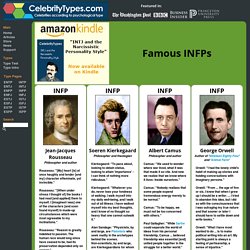
" Rousseau: "[When under stress I thought of] the books I had read [and applied] them to myself. I [imagined I was] one of the characters [and soon found myself] in made-up circumstances which were most agreeable to my inclinations. " Rousseau: "Reason is greatly indebted to passion. Soeren Kierkegaard. Blackswan assessment. INFP Credo: "Be guided by your heart" INFP Keywords: Loyal, Shy, Helpful, Dependable, Committed, Deep, Sympathetic, Nosy, Imaginative, Resourceful, Caring, Gentle, Idealistic The INFP has two contrary characteristics, curiosity and shyness. They love to know what's going on, feel excluded if not kept informed but do not like to be the centre of attention. The INFP always wants to be invited to the party - even though the chances are she won't show up!
There is a sensitive, caring side to the INFP which means they will be see the interconnections between people and pick up on the verbal and non-verbal cues. The INFP would not appreciate criticism or a hard task-master. The INFP values most those who take the time, trouble and effort to really get to know them. INFP Personality Test. Infp acting out. INFP. This article is about the Myers-Briggs personality type. For the Socionics INFp, see Intuitive Ethical Introvert. INFP (introversion, intuition, feeling, perception) is an abbreviation used in the publications of the Myers-Briggs Type Indicator (MBTI) to refer to one of sixteen personality types.[1] The MBTI was developed from the work of prominent psychiatrist Carl G. Jung in his book Psychological Types. Jung proposed a psychological typology based on the theories of cognitive functions that he developed through his clinical observations. MBTI instrument[edit] The MBTI preferences indicate the differences in people based on the following:[4] By using their preference in each of these areas, people develop what Jung and Myers called psychological type.
The MBTI tool consists of multiple choice questions that sort respondents on the basis of the four "dichotomies" (pairs of psychological opposites). I – Introversion preferred to extraversion: INFPs tend to be quiet and reserved.